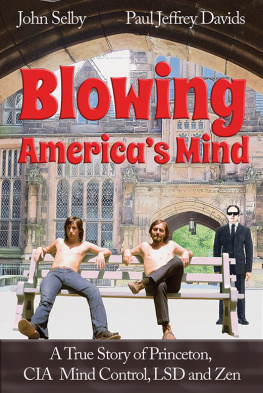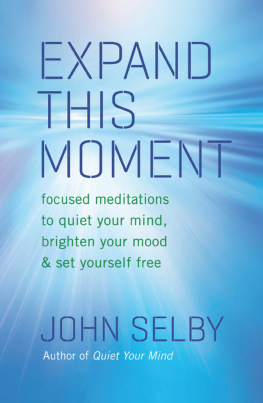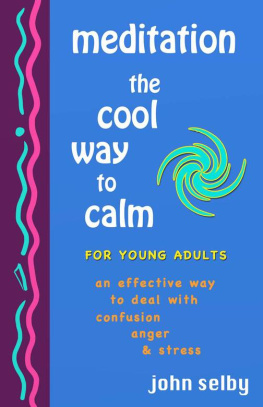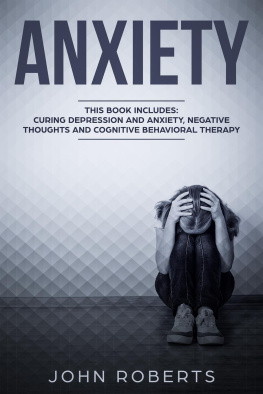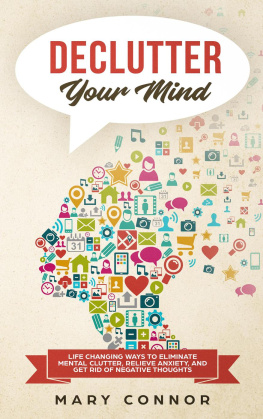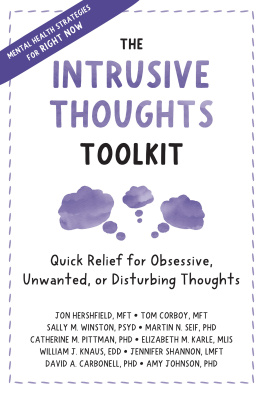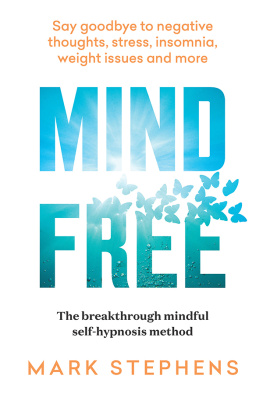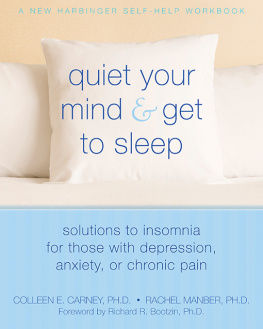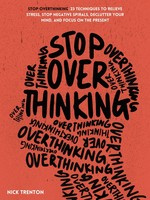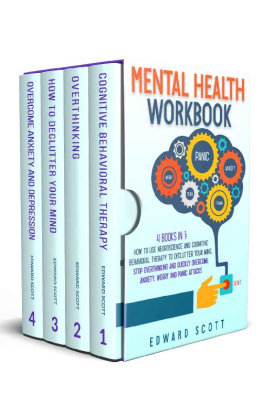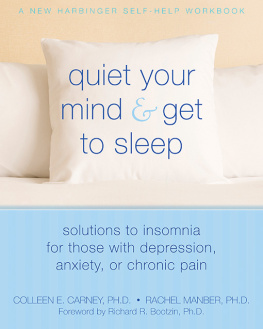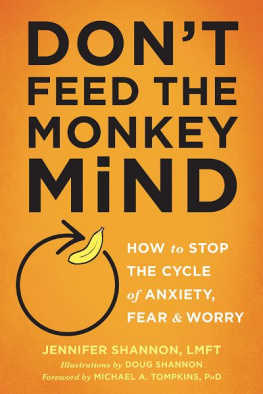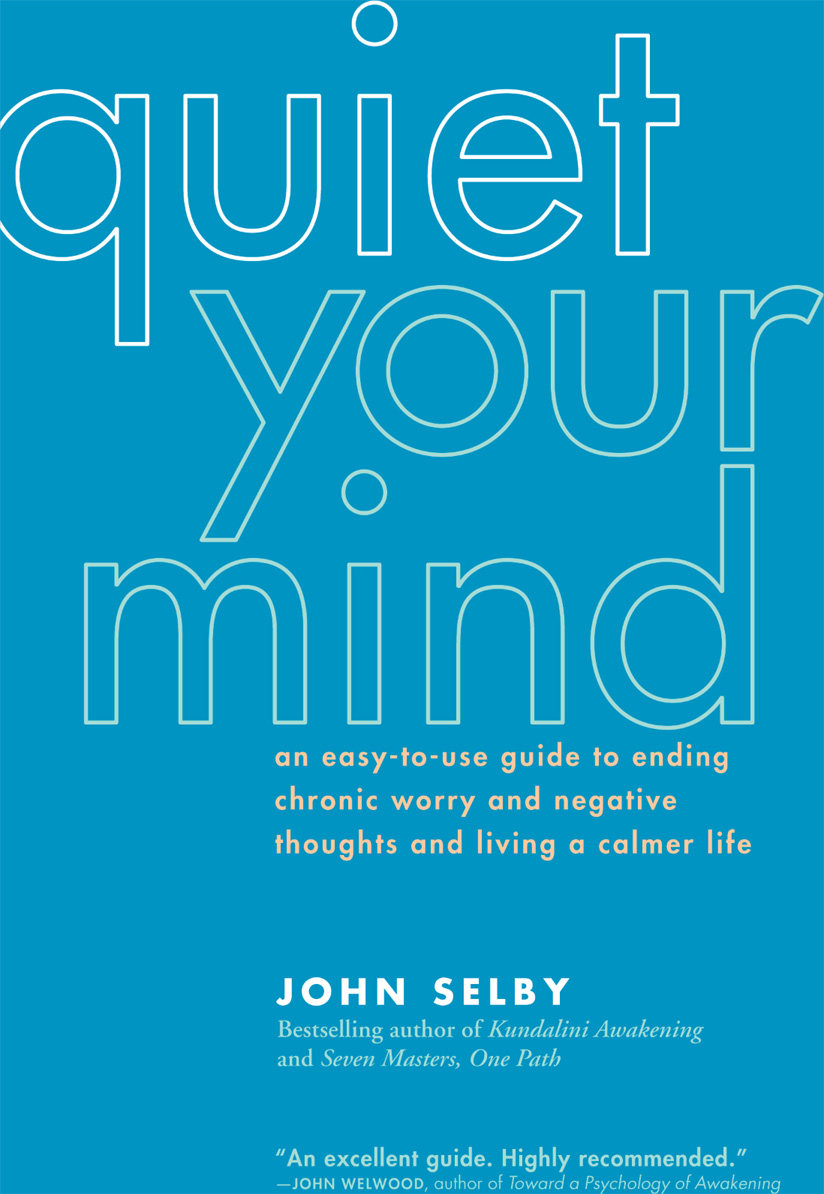QUIET YOUR MIND
ALSO BY JOHN SELBY
Seven Masters, One Path
Kundalini Awakening
Conscious Healing
Finding Each Other
Shattering Jade
Sex and Spirit
Secrets of a Good Nights Sleep
Fathers: Opening Up
Immune System Activation
Enjoying Solitude
Peak Sexual Experience
The Visual Handbook
Couples Massage
Powerpoint
JOHN SELBY

| New World Library
Novato, California |

| New World Library
14 Pamaron Way
Novato, California 94949 |
2004 by John Selby
All rights reserved. No part of this book may be reproduced by any means or in any form whatsoever without written permission from the publisher.
Book design by Maxine Ressler
PUBLISHER CATALOGING-IN-PUBLICATION DATA
Selby, John.
Quiet your mind / John Selby.
p. ; cm.
Originally published in German.
Includes bibliographical references.
ISBN : 978-1-930722-31-6
1. Attitude (Psychology) 2. Emotions. 3. Quality of life. 4. Mental health. I. Title.
BF 327 . S 45 2004
ISBN : 978-1-930722-31-6
Printed in Canada
10 9 8 7
Contents

For hundreds of years now, Western civilization has become more and more engulfed in the thinking minds grand assumption that its own mental chatter and nonstop flow of judgments and worries is the most important happening on planet Earth. Ever since Descartes made his intellectuals assertion Cogito, ergo sum I think, therefore I am the talkative function generating our stream-of-consciousness commentary on everything happening around us has gained free reign to dominate almost every moment of our lives.
I would like to quietly yet forcefully challenge this ego assumption that we function best, and enjoy life to the fullest, when were habitually engaged in nonstop mental reflections, worries, plottings, and judgments. In exact contrast, this book will demonstrate that only through regularly quieting the entire flow of thoughts, images, memories, and reflections that fill our minds can we regain intimate and fulfilling contact with sensory, intuitive, and heart-felt experiences that emerge when we shift into direct encounter with the world around us.
Brain scans show that the energetic functioning of our brains changes dramatically and immediately when we shift from left-brain deductive thinking to more right-brain and even whole-brain intuitive and experiential modes of consciousness. Related studies also indicate that we must choose between being absorbed in deductive verbal reasoning (a past-future function of the mind) and direct experience of the world (a present-moment function of the mind) because its very difficult to do both at the same time. Consciously or unconsciously, were constantly choosing to be engaged either in thoughts about life or in the direct experience of life.
As a first goal, the following discussions will shine a bright spotlight on this ultimate mental choice and demonstrate that maintaining a healthy balance between direct experience in the present moment, and cognitive reflection upon that experience is the ideal mental flow for a fulfilled life. We will then learn the most effective psychological techniques for shifting from thinking to experiencing on a regular basis.
Freedom from Mood Swings
Allowing our minds to be consumed in chronic thought-flows not only shuts us off from direct present-moment encounter with the world around us, but it also leaves us vulnerable to an overdose of negative emotions that can confuse our minds, stress out our bodies, and destroy any feelings of peace, joy, and transcendence. Cognitive psychology has proven that most of our upsetting emotions are directly caused not by whats going on around us, but by fear-based thoughts were habitually running through our minds. One goal of this book is to make sure that we understand the true source of our negative mood swingsand we will learn practical and effective psychological techniques for putting aside those thoughts that pollute otherwise enjoyable and fulfilling lives.
Most of us would give a great deal to break free of the mental agitations and tensions that consume so much of our inner lives. Rather than remaining chronically fixated on often-disturbing thoughts about our worries and confusions, conflicts and frustrations, wed certainly prefer to be enjoying the simple yet elusive qualities of mental clarity, heartfelt intimacy, inner peace, and emotional calm not to mention the even more valuable realms of intuitive realization and bliss.
But its often assumed that having worried chatterbox minds is just our God-given nature that we have no choice but to accept our fate of being dominated by thought-flows that keep our emotions stirred up and our minds agitated. Many people, especially intellectuals who live almost all the time in their thinking minds, actually believe that its impossible to quiet the flow of thoughts through their heads.
As we will explore in depth in this book, such a fatalistic assumption about our mental functioning is now known to be false. We do possess the inherent power to control the content of our thoughts and quiet chronic thought-flows altogether whenever we choose.
Of course, a certain amount of mental problem solving and cognitive reflection is essential to human life, and can actually be quite fun, even deeply fulfilling. Deductive thinking is an invaluable mental tool enabling us to create and maintain our entire technological civilization. Furthermore, regularly entertaining uplifting thoughts that brighten our lives, give philosophical meaning to our existence, and encourage positive feelings can be a great help in raising our spirits and spreading joy around us.
However, all too often our habitual thought-flow carries a negative rather than a positive emotional edge, generated by old fear-based attitudes, assumptions, and beliefs that no longer correctly reflect our present reality. Predictably, such thoughts from outdated or distorted beliefs provoke anxious, aggressive, and depressive emotions which in turn make us suffer.
Usually were not aware of the underlying source of such mood swings. Minor or sometimes even major attacks of anxiety and anger, depression and hopelessness, inadequacy and guilt, seem to sneak up out of the blue and overwhelm us. If only we could avoid getting caught up in such mood swings, it would be a joy to wake up to life each morning.
Experiential Realms
In our pragmatic day-to-day lives, how can we act to break free from the feeling that we are helpless victims of our own negative moods and thought-flows? What is the underlying psychological process that enables us to shift from thoughts that tend to upset our lives, to a more experiential present-moment state of mind?
The professional resolution to this question has been evolving for a hundred years now, beginning with the pioneering explorations of Sigmund Freud, Carl Jung, Erich Fromm, Krishnamurti, and Wilhelm Reich, and advancing in the mid-1900s to the more present-moment approaches of Gestalt therapy, transactional analysis, reality therapy, and bioenergetics. Then in the early 1960s psychologist Aaron Beck formally documented what observant folk, especially in meditative communities throughout the world, have known for centuries: Our emotions dont emerge suddenly out of nowhere. Just the opposite, they are almost always being stimulated by habitual thoughts and related images we keep running through our minds, often at a mostly subliminal level of awareness.


